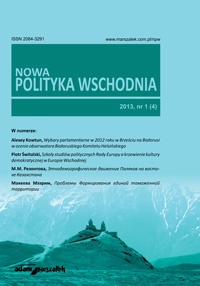Wilhelm Storosta (Vydunas) – patron litewskiej tożsamości czy ruchów neopogańskich?
Wilhelm Storosta (Vydunas). Patron of Lithuanian Identity or Neo-Pagan Movements?
Author(s): Mariusz MaszkiewiczSubject(s): Politics / Political Sciences, Politics, Political history, Social history
Published by: Wydawnictwo Adam Marszałek
Summary/Abstract: This article refers not only to the biography of Wilhelm Storosta (Vydunas) and his works and creations but more to his intellectual, philosophical and literary influence on the next generations of Lithuanian political and cultural elite. Storosta (1868-1953) most of his active life spent in East Prussia, in Tylsit (now Sovietsk) his was the teacher and preceptor of Lithuanian youth, founder of theaterы and folk circles that reconstructed the unique beauty of Lithuanian cultural legacy deeply rooted in pre- Christian tradition. Storosta studied philosophy and anthropology in Berlin and Leipzig. There he discovered firm relations between Baltic nations (philology, ethnology) and Indo-European tradition. His output is often called by his domestic followers and researchers “vydunism”, and it is the inspiration for studies in many branches of human sciences (eg. ethnography, ethnology, culture and religious studies). In the 70’s in occupied Lithuania there appeared many folk circles of a hidden anti-Soviet character what then beget generation of activists of the Lithuanian national revival of the 80’s and 90’s. But there’s one another inter-esting aspect of Vydunas’ creativeness – his theatrical productions. Such pieces as: “Shadows of ancestors”, “Star’s itineraries” or “Sea bells” that were translated into the Polish language and had an impact on the Polish intelligentsia in Vilnius before WWII. The Author tried to reconstruct in his theatrical works an atmos-phere of pre-Christian Lithuanian culture that inspires even today many activists of pagan cults and movements. Back in the 20’s associations were formed called “Romuva” aimed at the rebirth of ancient Lithuanian tradition and religious cul-ture. Therefore it is no exaggeration when we call today Vydunas one of great fa-thers of Lithuanian national identity.
Journal: Nowa Polityka Wschodnia
- Issue Year: 4/2013
- Issue No: 1
- Page Range: 183-209
- Page Count: 27
- Language: Polish

